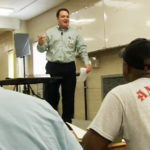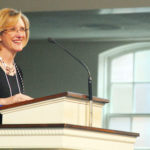Posted: 11/07/03
EDITORIAL:
What do you have to do to call your church 'Baptist'?
A lawsuit in Georgia has raised a good question: Who owns the rights to a religious name?
The Roman Catholic Archdiocese of Atlanta has sued Mision Catolica: Capilla de la Fe (Catholic Mission: Chapel of Faith), charging the network of Spanish-speaking churches falsely represents itself as Catholic.
“You cannot simply set up whatever church and call yourself 'Roman Catholic.' That's fraud,” archdiocese attorney David Brown declared.
Archdiocese officials claim the Capilla de la Fe churches conduct Mass, trick new immigrants into believing the congregations are affiliated with the Roman Catholic Church and “raise considerable funds” trading on the Catholic name.
This situation bursts with irony. On the one hand, the Roman Catholic Church says Capilla de la Fe illegally benefits from using “Catholic” in its name. On the other, more and more churches have dropped “Baptist” from their names, explaining the label is a liability when they try to reach out to people in their communities.
| Although threatened by new trends, the name “Baptist” still stands for believer's baptism by immersion, the Bible, religious liberty and missions. |
Suppose, however, a church still wants to write “Baptist” on its marquee. What are the absolute minimum standards, beliefs and practices that should qualify a congregation for the name?
Of course, myriad distinctions define Baptist churches. Many of them are quite common to various denominations. Let's set apart those characteristics that have given Baptists their unique perspective, form and personality.
Historically, Baptist conventions themselves have set a low bar, with two primary standards–money and “cooperation.” Both the Baptist General Convention of Texas and the Southern Baptist Convention constitutions describe the financial qualifications required for churches to send messengers to the annual meeting, the primary yardstick for defining a church as Southern or Texas Baptist. The constitutions also stipulate that affiliated churches should be “in friendly cooperation” (SBC) or “voluntarily cooperate” (BGCT) with the conventions.
So, strictly speaking, a church can call itself “Baptist” if it gives money to a Baptist convention and in some way supports denominational programs.
But what makes a Baptist church truly Baptist? Here are some traits that have distinguished Baptists for almost 400 years:
Believer's baptism by immersion. This is where we get our name. Baptists historically believe baptism by immersion is a symbol of Christians' obedience to Jesus' command to be baptized; identification with Jesus' death, burial and resurrection for our sins; affirmation of our own death to sin and new life in Christ; and faith in eventual resurrection and eternal fellowship with Christ.
Since we do not believe baptism is necessary for salvation or has power to save, we do not baptize infants to secure their salvation. Our forebears suffered extreme persecution for refusing to baptize their infants, and yet they persevered, wearing their name “Baptist” as a badge of faithfulness.
This belief is threatened on two fronts today. Some churches are baptizing children at increasingly young ages. When children who cannot understand their actions are baptized, the practice borders on pedobaptism or infant baptism. Other churches are urged to negate the importance of believer's baptism and baptism by immersion, primarily through the influence of believers who join from other faiths–some who were baptized as infants and some who were sprinkled–who do not wish to be baptized again as an adult.
![]() Authority of the Bible as God's word. Whatever language they use to describe it, Baptists traditionally have strongly affirmed the Bible as a completely authoritative and trustworthy guide to Christian faith and practice.
Authority of the Bible as God's word. Whatever language they use to describe it, Baptists traditionally have strongly affirmed the Bible as a completely authoritative and trustworthy guide to Christian faith and practice.
The primary challenge to the historic undertanding of the Bible now comes from the right. Some people who claim the name “Baptist” seem to elevate Scripture to the authoritative level of deity, a position seemingly taken by the 2000 Baptist Faith & Message statement.
![]() The religious-liberty cluster. From our beginnings, Baptists have understood that each soul, every person, is competent to relate directly to God and seek divine guidance. This is why we believe in the priesthood of the believer, the doctrine that each Christian is privileged and responsible to stand before God and needs no intermediary or priest to arbitrate forgiveness of sins and holy wisdom. This is why we practice democratic church governance, because we believe God leads Baptists through the divine direction provided to the believer-priests collectively. A corollary to this is the autonomy of the local church. No ecclesiastical authority reigns over the individual congregation, because, as a gathering of believer-priests, the local church is able to chart its own course under God.
The religious-liberty cluster. From our beginnings, Baptists have understood that each soul, every person, is competent to relate directly to God and seek divine guidance. This is why we believe in the priesthood of the believer, the doctrine that each Christian is privileged and responsible to stand before God and needs no intermediary or priest to arbitrate forgiveness of sins and holy wisdom. This is why we practice democratic church governance, because we believe God leads Baptists through the divine direction provided to the believer-priests collectively. A corollary to this is the autonomy of the local church. No ecclesiastical authority reigns over the individual congregation, because, as a gathering of believer-priests, the local church is able to chart its own course under God.
Through these understandings, Baptists historically have been the foremost champions of religious liberty and the separation of church and state. We instinctively know that to be authentic, faith must be free. Coerced faith is not faith at all. Government interference in church matters, and vice-versa, weakens the church and corrupts the government. Baptist history is written with the blood of martyrs who died for these principles. American history is written, in part, with the sweat of Baptists who labored to secure these liberties.
Unfortunately, several forces seek to undermine these principles. One is a denominational tendency toward control that seeks to tell congregations what they can and cannot do and whom God can and cannot call as their pastor. Another is a desire for funding faith-based programs that willfully accept government money, turning a blind eye to the likelihood that all such money comes with government strings attached in the form of regulations and oversight. A third is disdain for the religious beliefs of minority religions to the degree it would disallow them to practice their faith freely.
![]() The priority of missions. With the exception of the hyper-Calvinist Primitive Baptists, Baptists have been global leaders in world missions. We take seriously Christ's command to carry the gospel to “the uttermost parts of the earth.” Even when Baptists divide, the first thing we do is start another missions program.
The priority of missions. With the exception of the hyper-Calvinist Primitive Baptists, Baptists have been global leaders in world missions. We take seriously Christ's command to carry the gospel to “the uttermost parts of the earth.” Even when Baptists divide, the first thing we do is start another missions program.
All kinds of Baptists continue to do all kinds of missions. The chief threat on the horizon is the resurgence of hyper-Calvinists. They claim to be missions-minded, but the logical progression of their theology would lead Baptists away from missions, since God would save whoever God chooses, no matter what people do.
![]() Consistent contrariness. Sadly, Baptists shift toward schism. The first Baptist church endured division, and we have fought ever since. Walter Shurden wrote one of the best Baptist histories, “Not a Silent People,” as a story of denominational discord. Unfortunately, from convention conflict to worship wars, we show few signs of letting up.
Consistent contrariness. Sadly, Baptists shift toward schism. The first Baptist church endured division, and we have fought ever since. Walter Shurden wrote one of the best Baptist histories, “Not a Silent People,” as a story of denominational discord. Unfortunately, from convention conflict to worship wars, we show few signs of letting up.
Despite this last characteristic, “Baptist” is a good name. It stands for virtues that are vital among the fellowship of the faithful.
–Marv Knox
E-mail the editor at [email protected]














We seek to connect God’s story and God’s people around the world. To learn more about God’s story, click here.
Send comments and feedback to Eric Black, our editor. For comments to be published, please specify “letter to the editor.” Maximum length for publication is 300 words.